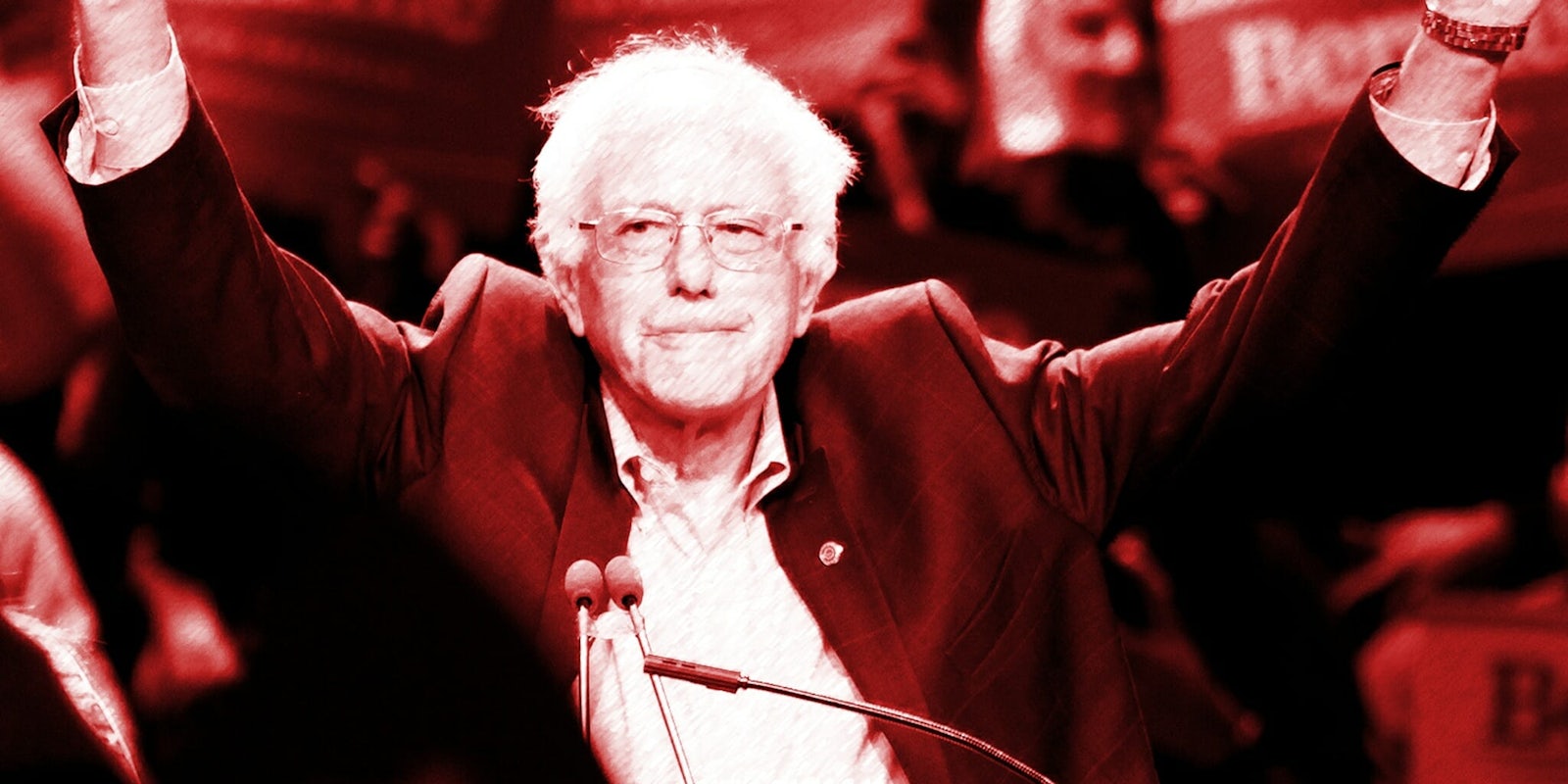In tonight’s Democratic presidential debate, Sen. Bernie Sanders (I-Vt.) will take his first big step in avoiding the fate that befell another Vermont liberal, former Gov. Howard Dean, whose candidacy tanked after the public got a negative first impression of him, following his defeat in the Iowa caucuses. Part of this will depend on Sanders’ own performance, but much more will have to do with whether he is truly bringing about the radical game change that’s fueled his rise on the Internet. The question is: Will America #FeelTheBern?
It’s important to remember that the comparison between Sanders and Dean is mainly strategic. Sanders has made it clear that he does not view his campaign as merely symbolic; the man who openly identifies as a Democratic Socialist intends to become the 45th President of the United States. Because of the prevailing assumption within the party establishment that America will never elect him, he has received scant institutional support.
His first congressional endorsement came last week, a delay that is unheard of among candidates doing as well as he is in the polls. Even though his fundraising record is impressive, there is the possibility that, as with Dean in 2004, the Sanders surge of 2015 is simply a spike of enthusiasm among the party’s base of progressive idealists that will be quickly be quelled by the nomination of someone more “electable.”
That term, electable, deserves to be further scrutinized. Anyone who tells you that the term—as conventionally used—is entirely devoid of subjective bias is kidding themselves. Plenty of objective data can be found among analysts like Nate Silver and the gurus of Five Thirty Eight, but it’s easy to use statistics to convince yourself (and others) of anything. When it comes to what is considered “electable,” that has more to do with what people seem to consider a choice that the masses will readily accept.
Aside from being relatively scandal-free, the one necessary quality for electability is that the candidate come from one of the two major political parties. Having narrowed the contest to two candidates (occasionally three), a presidential candidate is assessed based on his qualifications. Typically, it comes down to experience in politics, achievement in the private sphere, a certain amount of charisma or gravitas, and whether his ideals and issue stances are in keeping with America’s presumed centrist proclivities—in other words, electability.
Sanders is banking on the fact that people want radical solutions. If he’s right, then the conventional wisdom that once dictated presidential elections in this country no longer applies.
Therein lies the key difference between Dean and Sanders. Although Dean was widely considered unelectable in 2004 and, thus, passed over in favor of John Kerry, he was not a self-proclaimed socialist. The party was concerned that he might be another George McGovern or Walter Mondale, but no one viewed him as unelectable on a more visceral level. Even if his opponents called him a socialist, they knew that that was a slur to be used against him, not a reality that would be dispassionately accepted by all sides.
Consequently, Dean had plenty of endorsements from establishment figures, including Al Gore himself, and was certainly accepted as a viable frontrunner in early 2004.
Sanders, by comparison, embraces the term “socialist,” one that could have landed him on a government blacklist within his own lifetime. Sanders has abandoned the party establishment and is technically registered as an Independent in the Senate.
Even the statisticians don’t consider him to have a serious chance of being nominated. When Dean says that Sanders is “an attractive candidate [who] is basically calling out the Democrats, much the way I did in 2004,” he misunderstands what Sanders represents. Dean didn’t wish to be viewed as a radical, while Sanders is banking on the fact that people want radical solutions. If Dean is right, then the conventional wisdom that once dictated presidential elections in this country no longer applies.
Just look at the Republican race. Donald Trump is the frontrunner, with Ben Carson close at his heels. The GOP hasn’t nominated a candidate without political experience, based solely on his business record, since Wendell Willkie in 1940—and he was a center-leftist who drew his support from Wall Street and academia.
By contrast, Trump is being called a fascist by Newsweek—while other frontrunners like Ben Carson and Sen. Ted Cruz (R-Texas) are widely regarded by the establishment as too right-wing. All three have been ridiculed as too gaffe-prone— in short, unelectable.
My hunch is that these parallel political phenomena in the two political parties—you know, the ones that have produced every American president since the 1850s—could be signs of something bigger. If it is even remotely possible that Trump, Carson, or Cruz could be nominated by the Republicans, then it is at least as likely that Sanders can be nominated by the Democrats.
Is this a prediction? Not really—the Democratic and Republican parties have both undergone periods of radical reinvention in the past, so it’s entirely conceivable that one could be happening in the post-Obama era. That said, one is usually better off sticking with the conventional wisdom, which means here that the Democrats will probably nominate Hillary Clinton or Joe Biden, and the Republicans will go with Jeb Bush, Marco Rubio, Chris Christie, or John Kasich.
Nevertheless, we should be on the lookout tonight to see whether Sanders will conclusively demonstrate whether he’s next Howard Dean. There is no guarantee that a radical moment is coming, but it’s enough of a possibility that we all should watch.
This piece originally appeared at the Good Men Project, and is republished with permission.
Matt Rozsa is a Ph.D. student in American history at Lehigh University who specializes in national politics. As a political columnist, his editorials have been published on Salon, Mic, and MSNBC.
Photo via Gage Skidmore/Flickr (CC BY SA 2.0) | Remix by Jason Reed


